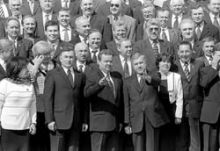The people’s deputies of Verkhovna Rada gathered for their farewell session last Thursday. The whole affair reminded one of a high school senior prom or maybe more like a university graduation ball. While everybody attends a senior prom, university students may miss the graduation banquet if busy working, attending classes, and for other reasons. Although 351 formally registered, the hall was half empty. True, many deputies were hanging around in the lobby, gathering according to their various interest in the hall and back rooms.
Speaker Ivan Pliushch called the session to order and read the president’s address. After that representatives of factions took turns at the rostrum, each with a story about his performance, attainments, failures, and shortcomings of the regime (some took advantage to call for changes in the political system). The campaign excitement was still in the air. Lawmakers who failed to get seats in the new parliament dwelt on the adverse effect of the administrative resource, breaches of the election law, etc., assuring those that cared to listen of their highly productive work for the benefit of their respective constituencies. Green leader Vitaly Kononov, for one, insisted that his party was to be credited for outlawing capital punishment. He stressed that the Green idea was implemented in parliament very actively and consistently, and promised that they would return. All told, the last session was marked by a languid atmosphere, save for the rostrum renditions by Regions of Ukraine leader Volodymyr Rybak and one of the SDPU(o) leaders Oleksandr Zinchenko. The former once again touched the deputies’ sore spot, recalling the For a United Ukraine (known by its Ukrainian acronym, ZaYedU) turnout of 12%, indicating the degree of voter confidence in the powers that be. This assumption caused the Left and Right (opponents and ideological adversaries by definition) to object indignantly and unanimously, shouting and stamping their feet. Oleksandr Zinchenko, in turn, recalled of the role played by the United Social Democratic fraction and its leader in passing a number of important codes allowing “further reform in the political system.”
The Left responded with a halfhearted han’ba! [shame in Ukrainian, a language many leftists otherwise ignore — Ed.] at the mention of the Land Code as Zinchenko went on to say that the code allowed 11 million citizens to receive their plots. This marked the end of political emotions and the rest of the session passed in its normal (drowsy) mode.
After summing up the results, the speaker closed the session and reminded the press of a democratic rule observed all over the world, such that the political force with the greatest number of votes is entitled to form the parliamentary majority and cabinet.
In Ukraine, this force is Our Ukraine, he said, because it had been supported by fifteen regions. Speaker Pliushch believes that the majority can be built jointly by Yushchenko’s Our Ukraine and For a United Ukraine. At the same time, he noted that ZaYedU has “several dozen leaders that seem to be at odds with Viktor Yushchenko.” He said he was convinced that two fractions could serve as a basis for a “working majority.” Incidentally, Premier Anatoly Kinakh, addressing the closing session, stressed that constructive cooperation with Verkhovna Rada remains a priority for the Ukrainian government. He further declared that constructive cooperation between the executive and legislative branches cannot depend merely on the political alignment of forces. Interestingly, Mr. Pliushch also noted in his speech that it would be very important for the next parliament, considering that it would include 185 Solons of the present convocation, to preserve the continuity of the legislative process and constructive work for the voters’ benefit. In this context, when asked by The Day whether he was satisfied with his own performance as speaker, Mr. Pliushch’s response was rather strange. Frowning, he said, “I am not accountable to The Day.” Well, we believe that this or that periodical is not the point; the point is that our readers are citizens of Ukraine, the electorate, Ivan Pliushch included.
In contrast, all the other people’s deputies were in a responsive mood. Leonid Kravchuk said he was not satisfied with his performance and that he wished he had done more. But to do more, he pointed out, one aye was not enough. It took 226. And that lack of concerted action in Verkhovna Rada did not allow a better lawmaking performance. His colleague Oleksandr Zadorozhny, on the contrary, felt satisfied, for parliament had passed 55 bills on his personal initiative. At the same time, he was convinced that, given constructive cooperation, more could have been accomplished. We will soon know how well the new parliament has learned from its past mistakes.







